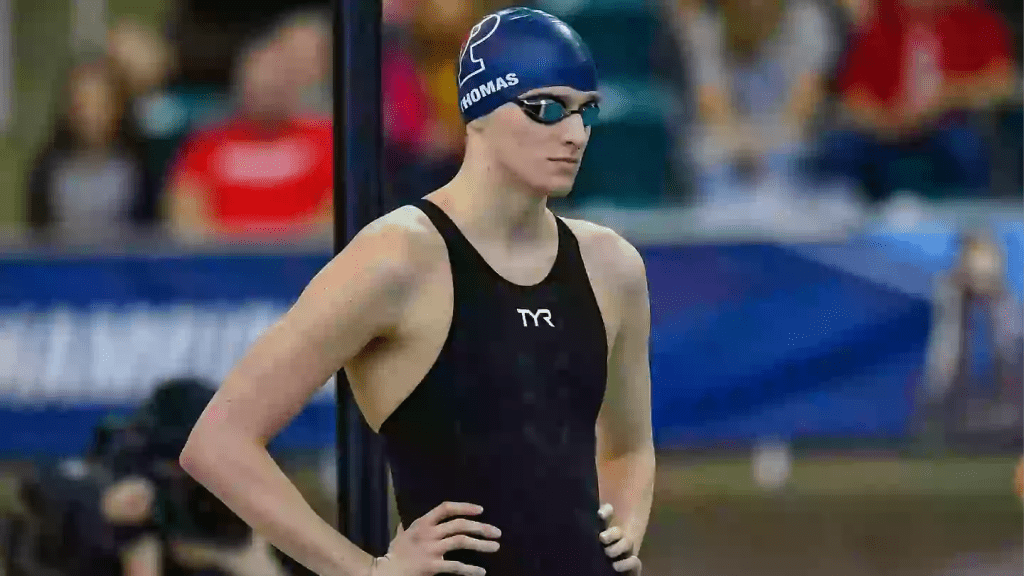Former Teammates of Lia Thomas File Lawsuit Amidst Controversial Ban
The debate surrounding transgender athletes in women’s sports has reached new heights as three former University of Pennsylvania swimmers have filed a lawsuit against the institution, just hours before former President Donald Trump signed an executive order banning transgender women from competing in female sports.

The lawsuit, filed by Grace Estabrook, Margot Kaczorowski, and Ellen Holmquist, alleges that they endured emotional trauma due to being forced to compete alongside Lia Thomas, a transgender athlete who dominated women’s swimming competitions. Their legal action demands that the Ivy League expunge Thomas’ records, citing unfair advantages and emotional distress.
This high-profile case comes at a time when the political landscape is shifting, with Trump’s order reinforcing his administration’s stance that biological males should not compete in women’s sports.
The Lawsuit: A Fight Against Alleged Emotional Trauma
According to legal documents obtained by Fox News, the former swimmers claim that UPenn administrators disregarded their concerns and instead encouraged them to seek counseling if they struggled to accept Thomas’ inclusion on the team.
The lawsuit highlights that university officials organized a mandatory “Trans 101” session, during which athletes were allegedly pressured to conform to pro-trans ideology. The plaintiffs argue that they were made to feel as though their discomfort with a “trans-identifying male” competing alongside them meant they were mentally unstable.
Furthermore, the women claim that Thomas’ presence in the locker room was an additional source of distress. Initially assured that they would not be required to share changing spaces with Thomas, they later found that the rules had changed, forcing them to undress in front of a biological male.
The lawsuit describes the moment when Kaczorowski discovered Thomas in the women’s locker room, stating:
“Margot only learned that Thomas had been authorized by UPenn to use the women’s locker room when she walked in to find Thomas in front of her changing his clothing.”
The athletes further allege that when they expressed their concerns to their coach, Mike Schnur, he acknowledged the issue but stated that he was powerless to take action.
Lia Thomas’ Controversial Dominance in Women’s Swimming
Lia Thomas, who initially competed on the UPenn Men’s Swimming and Diving team from 2017 to 2020, transitioned to the women’s team in 2019. Her participation sparked nationwide controversy when she broke multiple records at the 2022 Ivy League Championships, leading to intense debate over fairness in women’s sports.
Critics argue that biological males retain inherent physical advantages, even after transitioning, giving them an unfair edge over female competitors. Proponents of trans inclusion, on the other hand, argue that gender identity should dictate eligibility rather than biological sex.
The lawsuit asserts that Thomas’ participation effectively jeopardized opportunities for female athletes, depriving them of fair competition and recognition for their achievements.

Trump’s Executive Order: A Game-Changer for Women’s Sports
As the lawsuit gained traction, former President Donald Trump signed an executive order, reinforcing the legal recognition of only two genders: male and female. This order effectively bans transgender women from competing in female sports, citing the protection of fairness for biological women.
Trump’s decision aligns with many conservative viewpoints that advocate for biological sex-based protections in sports. The 78-year-old Republican, who has been vocal about his stance on gender identity issues, has taken a firm position in what has become one of the most divisive cultural debates in modern politics.
By signing this order, Trump has set a legal precedent that could impact collegiate and professional sports nationwide. However, LGBTQ+ advocacy groups have already announced plans to challenge the ruling in court, arguing that it violates the rights of transgender athletes.

The NCAA and Ivy League Under Fire
The lawsuit not only targets the University of Pennsylvania but also accuses the NCAA and the Ivy League of enabling Thomas’ participation, despite the mounting concerns from female athletes.
The plaintiffs argue that these organizations prioritized inclusivity at the expense of fairness, forcing them to compete in an environment where they felt their rights were being ignored.
They are demanding that a judge rule against Thomas’ eligibility in women’s sports and invalidate her records, emphasizing that her participation skewed the competition’s integrity.
The lawsuit is expected to ignite further legal battles, as sports organizations navigate how to balance inclusivity with competitive fairness.

A Defining Moment for Women’s Sports
The case against Lia Thomas and the subsequent ban on transgender athletes in women’s sports marks a pivotal moment in the fight for fairness in female athletics.
While some view these measures as a necessary step to preserve the integrity of women’s competitions, others argue that they are discriminatory and exclusionary.
Regardless of one’s stance, the debate over transgender inclusion in sports is far from over. As legal battles unfold, the sports world will have to grapple with complex questions about gender, identity, and fairness—all of which could reshape the landscape of women’s athletics for years to come.
Key Takeaways from the Lia Thomas Lawsuit and Trump’s Executive Order
- Three former UPenn swimmers filed a lawsuit, citing emotional trauma and unfair competition against transgender athlete Lia Thomas.
- The lawsuit claims UPenn administrators forced them to conform to pro-trans policies, disregarding their concerns.
- Lia Thomas, a transgender swimmer, broke multiple women’s records, igniting nationwide debate.
- Former President Trump signed an executive order banning transgender athletes from women’s sports, defining gender strictly as male and female.
- The NCAA and Ivy League are accused of enabling Thomas’ participation, despite widespread opposition.
- The lawsuit demands that Thomas’ records be vacated and that transgender women be barred from competing against biological females.
As the case gains traction, it will likely shape the future of sports policies, legal battles, and gender identity discussions across the country.